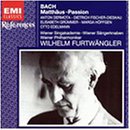| All Artists: Dietrich Fischer-Dieskau, Johann Sebastian Bach, Wilhelm Furtwängler, Anton Heiller, Vienna Philharmonic Orchestra, Franz Schutz, Elisabeth Grummer, Anton Dermota Title: Bach: Matthus-Passion / Wilhelm Furtwngler (Mono 1954 recording) Members Wishing: 0 Total Copies: 0 Label: Angel Records Original Release Date: 1/1/1954 Re-Release Date: 3/6/2001 Album Type: Import Genre: Classical Styles: Opera & Classical Vocal, Chamber Music, Historical Periods, Baroque (c.1600-1750), Classical (c.1770-1830), Modern, 20th, & 21st Century, Sacred & Religious Number of Discs: 2 SwapaCD Credits: 2 UPC: 724356550926 |
Search - Dietrich Fischer-Dieskau, Johann Sebastian Bach, Wilhelm Furtwängler :: Bach: Matthus-Passion / Wilhelm Furtwngler (Mono 1954 recording)
 | Dietrich Fischer-Dieskau, Johann Sebastian Bach, Wilhelm Furtwängler Bach: Matthus-Passion / Wilhelm Furtwngler (Mono 1954 recording) Genre: Classical
|
Larger Image |
CD Details |
CD ReviewsBring back the passion Curmudgeon | Connecticut | 03/11/2005 (5 out of 5 stars) "Oh, my God. Literally. If you are wondering what happened to the passion of Bach's Passions, try this recording. The opening chorus, which Klemperer treats with such magisterial beauty, here will rip you to shreds. The orchestral phrasing, perhaps especially in the woodwinds, is stunning throughout and seems to want to walk right out of the CD and embrace the listener with sorrow and grace. As a bonus, the sound quality is quite a bit better than on the Maestro's other recordings." For personal reasons... Howard G Brown | Port St. Lucie, FL USA | 05/14/2004 (5 out of 5 stars) ".... I give this 5 stars. If you are primarily interested in period performance Bach, this is not for you. If you are interested in modern instrument Bach with reduced forces and a strong sense of baroque style (Woldike, Richter), this is also not for you.This is in the romantic tradition of the 19th century, and it is not a complete performance -- there are cuts -- but I think it must approach what Mendelsohn offered his audience when he performed this work, and launched a Bach revival that continues to this day. (There is, in fact, a modern recording of the version used by Mendlesohn, but I have yet to hear it.) This is a broadly paced, reverential performance, beautifully performed. It is not in the hyper-inflated style of Beecham's MESSIAH out of Berlioz, but one does sense that Bruckner would have approved of this performance: sehr feierlich. Purists will be offended; they usually are. If Gardiner is far to the left of Klemperer, Furtwangler is far to the right. So, be warned. Personally, I love this recording, and probably for all the wrong reasons. Evidently love is not only blind, but deaf as well." Depth and Tragedy Derek Lee | St. Paul, MN USA | 04/14/2005 (5 out of 5 stars) "This recording embodies everything I love about Furtwangler's artistry with great clarity. If I had to pick two words to describe it, I would choose honesty and strength. Furtwangler's interpretation of the St. Matthew Passion (a work he dearly loved ever since his childhood) is nothing if not honest. He doesn't stop at rendering the score with beauty and pathos (as, for example, Karajan does), he dwells on each and every word of the Passion story, expressing them with incredible power. Furtwangler leaves nothing to chance: it is clear that over the decades he thought deeply over even the smallest details. This is another thing I love about his artistry: he was never satisfied with just achieving moments of inspiration, he demanded from himself that every moment have integral significance within the whole. The sense of architecture here is overpowering; for example, after the chorale wenn ich einmal so scheiden (delivered with a radiance that has to be heard to be believed) comes a moment that has to stand as one of the greatest in recorded music, when the chorus says "truly, he was the Son of God". The expression achieved cannot be put into words, it has such a powerful effect.
Even if the execution and the recording were poor, this would be worth buying for Furtwangler's visionary way with the score; thankfully though, both are on the whole excellent. The only minor quibbles one could have might be the audience noise (noticeable, but not overwhelming) and some of the vocalists (I have never been a great fan of Hoffgen (she seems so wobbly to me), and sometimes the choir is a little on the hazy side). Other than these truly minor points, the only situation I could imagine a person not liking this performance is if they had certain preconceived notions about what Bach is supposed to sound like, rather than taking this on its own terms. However, I feel that the greatness of a performance should stand on its own, and not rely on anything else (for example, on historical research). I would venture to say Furtwangler's recording of the St. Matthew Passion amply meets this requirement." |

 Track Listings (32) - Disc #1
Track Listings (32) - Disc #1